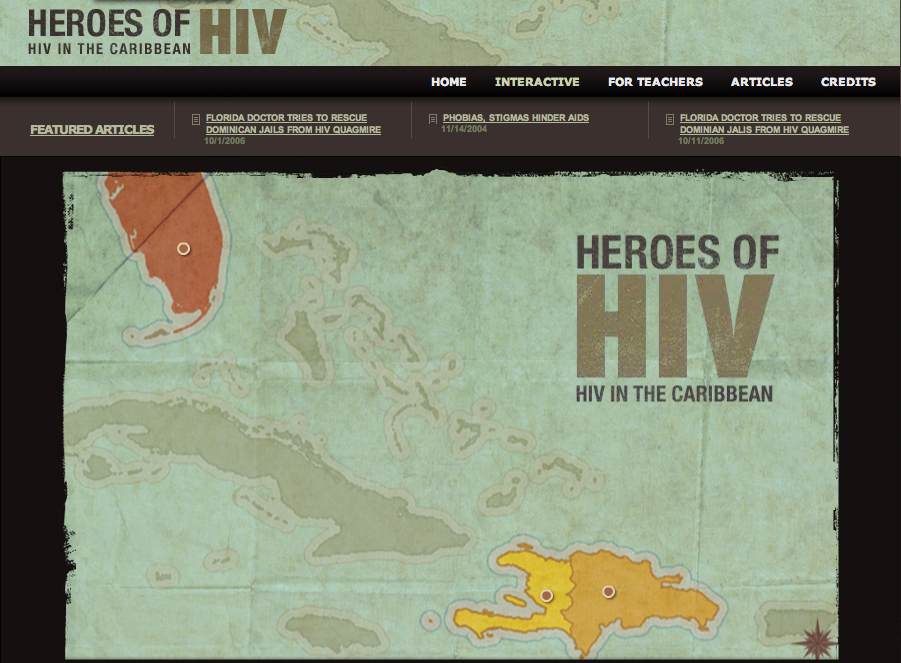
This Saturday, December 1, is World AIDS Day, a moment each year for special focus on the epidemic. Two hours away from American shores people face this epidemic daily. The Dominican Republic and Haiti boast the highest rates in this hemisphere of the virus that leads to AIDS. And it is a story that has been overlooked in the American mainstream media.
For the last three weeks, the Pulitzer Center has taken an in-depth look at HIV-AIDS in the Caribbean, and especially on the island of Hispaniola through the reporting of Antigone Barton, a staff reporter at The Palm Beach Post. Antigone now has put together a shorter overview of her reporting that will be available beginning this Sunday, December 2 – just a day after World AIDS Day - to any of the 600 newspapers subscribing to the New York Times/Cox Newspapers wire services.
Antigone's overview focuses in on two critical elements of her more extensive reporting – sex workers in the Dominican Republic and inmates in Haiti's national penitentiary in Port-au-Prince - and highlights the impact of U.S. restrictions on the use of AIDS funds.
The United States has sent more than $100 million dollars to fight HIV and AIDS on Hispaniola in the last three years. But those tackling the epidemic among sex workers and prison inmates do it without U.S. help because of those restrictions. These frontline fighters of the epidemic work with limited resources against seemingly insurmountable odds. They say that if AIDS is not confronted in these settings, the battle against it won't be won.
Antigone's overview offers a window into the more extensive Pulitzer Center-sponsored "Heroes of HIV: HIV in the Caribbean" reporting project and our first ever interactive website. Antigone pulled together a three-part series with a half dozen articles published in The Palm Beach Post over three Sundays this November. She received a Pulitzer Center reporting grant and additional support from the Ethics and Excellence in Journalism Foundation as a Pulitzer Center World Affairs Journalism Fellow to travel to the Dominican Republic and Haiti.
The Pulitzer Center also commissioned three documentaries produced by Steve Sapienza of Azimuth Media and aired on public television's Foreign Exchange. In addition, the Pulitzer Center commissioned the interactive website that complements the articles and the documentaries.
"Heroes of HIV: HIV in the Caribbean" is one of the most ambitious, exciting projects we've undertaken – and we believe a model of multi-platform projects that embrace traditional print and broadcast outlets, innovative web presentations, and non-profit organizations like the Pulitzer Center. I invite you to take a look at the interactive presentation; you can launch into it from the "Heroes of HIV: HIV in the Caribbean" map our home page.
This reporting project is also testament to many hands, working together – from the MAC AIDS Fund and the Educational Foundation of America to the International Center for Journalists, the National Press Foundation, the Ethics and Excellence in Journalism Foundation, Civitas Associates, and our own host organization, the World Security Institute … and of course our extraordinary colleagues at The Palm Beach Post, Cox Newspapers, bluecadet interactive, Azimuth Media/Foreign Exchange, and here at the Pulitzer Center. Coordinating all these elements is a little trickier than working within the confines of a single media outlet, but it has also made available to us resources, talent, and ideas that we would never have mustered on our own. The credits page on the interactive site shows you just how many people helped bring this project to light and the array of talents.
As with all Pulitzer Center reporting projects we look ahead as we take this wealth of information out into communities to tell this Untold Story across segments of American society. "Heroes of HIV" will also be one of our Global Gateway educational outreach programs, and lesson plans already are available on the interactive website.
Let us know what you think about the reporting and especially about the interactive website. Give us ideas of communities we can bring this information to over the months ahead. Get in touch with your local media outlets to let them know about Antigone's summary overview available on the New York Times/Cox Newspapers wire services.
Work with us to develop similar collaborations down the road on other issues that have been underreported around the world.
Don't forget to send your comments back, via this weblog or at [email protected]
If you haven't signed up as a subscriber to our newsletter please do so: It's a one-click step on our homepage and assures you'll always be up to date as to the latest news on Pulitzer Center projects





